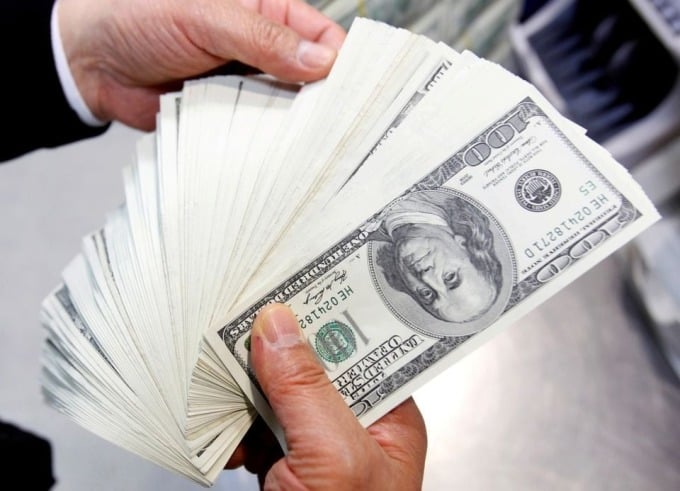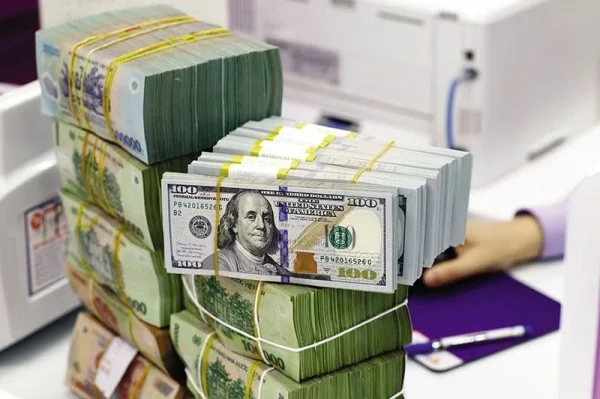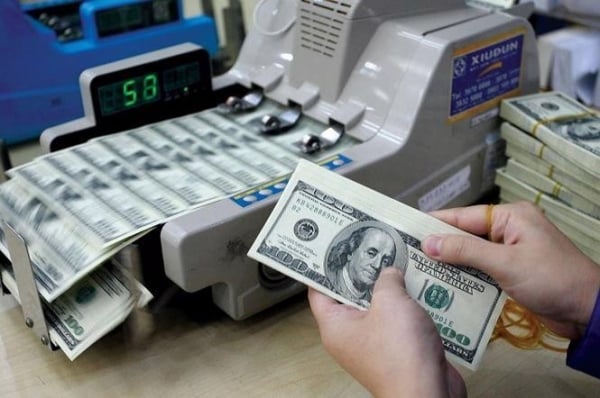The dollar has lost 3.7% against a basket of major currencies this month, on track for its biggest monthly decline in a year.
A weaker dollar is good news for countries that rely on imports, as most of their goods are denominated in dollars, and for countries that pay their debts in the currency. However, American businesses and consumers will have to pay more for imports.
The Dollar Index rose sharply from July to October, gaining more than 7%. The reason was a series of positive data on the US economy that fueled predictions that the Federal Reserve would keep interest rates high.
High interest rates will drive up the value of a currency. Investors expecting higher returns will put money into that country, thereby increasing the demand for the domestic currency.
However, in recent weeks, the US economy has shown signs of slowing down. This has led investors to believe that the Fed will complete the process of raising interest rates and cut soon.
The dollar has lost 3.7% against a basket of major currencies this month, heading for its biggest monthly decline in a year. "I expect the dollar to weaken for another two quarters, especially if there is more evidence of a Fed rate cut," Ulrich Leuchtmann, head of foreign exchange research at Commerzbank, told CNN.

A bank employee in South Korea counts US dollars. Photo: Reuters
Cameron Willard, a member of the capital markets research team at Handelsbanken (Sweden), predicts that the USD will continue to decline in the first half of next year. However, if geopolitical risks increase (such as instability after upcoming elections), the decline could reverse.
In times of uncertainty, investors see the dollar as a safe haven. They believe their assets will retain their value. "I don't think the dollar will depreciate in the long term. For that to happen, you need a credible alternative currency. But the dollar is still the world's reserve currency and the safest currency. I don't see that changing," Willard told CNN.
Who benefits from a weaker USD?
For countries that rely on imported goods, a weaker dollar means they have to pay less for essential products like wheat and crude oil, which should help cool inflation in those economies.
For example, Japan, South Korea, India, and many eurozone countries that rely on imports will benefit, according to Mark McCormick, director of foreign exchange and emerging markets at TD Securities.
US exporters also benefit, as their products become cheaper in other currencies, making their goods more competitive abroad.
In addition, Leuchtmann said imports into the US would also become more expensive, helping US businesses selling domestically compete better against foreign rivals.
This is also good news for emerging markets. Many countries currently borrow in dollars, so a weaker currency makes it easier for them to repay their debts.
A weaker dollar also increases investment opportunities outside the US. "Overall, a weak dollar is like a rising tide that lifts all ships," McCormick said.
Losers when the USD falls
Still, American consumers won’t be happy about the news. They’ll have to pay more for imported goods, like French wine, Chinese toys and overseas vacations.
“Basically, a weak dollar makes Americans a little poorer, because they have to pay more for imports, and get less for exports,” Leuchtmann said.
All else being equal, a weaker dollar would accelerate US inflation. However, inflation depends on many other factors. "I am sure US inflation will decline further. However, it will be slower than in the strong dollar scenario," Leuchtmann said.
Willard also said that a cooling U.S. housing and job market could help keep inflation in check, despite rising imports. "I don't think the Fed is going to be overly concerned about this," he said.
Ha Thu (according to CNN)
Source link



![[Photo] National Assembly Chairman Tran Thanh Man attends the ceremony to celebrate the 1015th anniversary of King Ly Thai To's coronation](https://vstatic.vietnam.vn/vietnam/resource/IMAGE/2025/4/13/6d642c7b8ab34ccc8c769a9ebc02346b)

![[Photo] Prime Minister Pham Minh Chinh chairs the Government's special meeting on law-making in April](https://vstatic.vietnam.vn/vietnam/resource/IMAGE/2025/4/13/8b2071d47adc4c22ac3a9534d12ddc17)
![[Photo] National Assembly Chairman Tran Thanh Man attends the Policy Forum on Science, Technology, Innovation and Digital Transformation](https://vstatic.vietnam.vn/vietnam/resource/IMAGE/2025/4/13/c0aec4d2b3ee45adb4c2a769796be1fd)


























































































Comment (0)